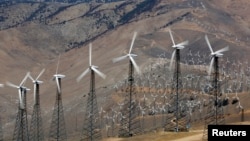As Washington digs out from a blizzard, congressional debate on the climate will heat up this week when the Senate takes up a far-reaching bill to reform and modernize America’s energy sector.
“An energy revolution has occurred in our country,” said the chairman of the Senate Energy Committee, Republican Lisa Murkowski of energy rich Alaska.
Having lifted a ban on U.S. oil exports, lawmakers will consider provisions facilitating America’s export of natural gas and domestic production of strategic raw minerals. The bill also seeks to upgrade America’s electric grid and promote energy efficiency in government and commercial buildings.
Murkowski says, if implemented, the legislation will help make the United States a global energy superpower.
“It will help America produce more energy. It will help Americans pay less for energy. We agreed to boost liquefied natural gas exports to boost our economy and the security of our allies. We agreed to promote hydropower, not to mention geothermal and other clean, renewable resources,” she said.
‘Locked in a global battle’
The bill aims for a delicate balance between competing partisan interests. On the one hand, it seeks to satisfy defenders of the fossil fuel industry, like Republican Senator John Hoeven of North Dakota.
“We are locked in a global battle to determine who will produce oil and gas in the world in the future. Will it be OPEC, Russia, Venezuela? Or will it be us?” Hoeven asked.
At the same time, it aims to win the support of lawmakers worried about climate change. Rhode Island Democrat Sheldon Whitehouse comes to the Senate floor every week the chamber is in session to deliver a speech on the perils of a warming planet.
“2015 was the warmest year ever recorded on earth. That’s a fact. And it’s not an anomaly,” Whitehouse said last week.
Far more important than the support of any one senator is that of President Barack Obama, who can sign or veto legislation. Late last year, the Republican-led House of Representatives passed an energy overhaul that envisions a prominent role for fossil fuels well into the future. The bill got just nine Democratic votes, and the White House says Obama will veto it if the legislation reaches his desk.
Amendments as wildcard
In its current form, the Senate version appears to have enough bipartisan support to advance and pass the chamber. But individual senators can propose amendments that, if adopted, could alter vote totals and decide whether the bill earns the president’s backing.
Having committed the United States to a landmark global climate pact, Obama wants to steer America to a clean energy future. He spoke at length about climate change and energy at his State of the Union address earlier this month.
“We’ve cut our imports of foreign oil by nearly 60 percent, and cut carbon pollution more than any other country on Earth. Gas under two bucks a gallon ain’t bad, either,” the president said. “The jobs we’ll create, the money we’ll save, the planet we’ll preserve -- that is the kind of future our kids and our grandkids deserve. And it's within our grasp.”
The Obama administration has imposed carbon emissions restrictions on U.S. power plants, and restricted drilling and mining for fossil fuels on federal lands. Both actions irk Murkowski.
“President Obama has ignored the good work going on in Congress as he attempts to unilaterally recast our nation’s energy policy. His gauntlet of burdensome regulations, many just beginning to take effect, threatens the affordability and reliability of our energy,” she said.







